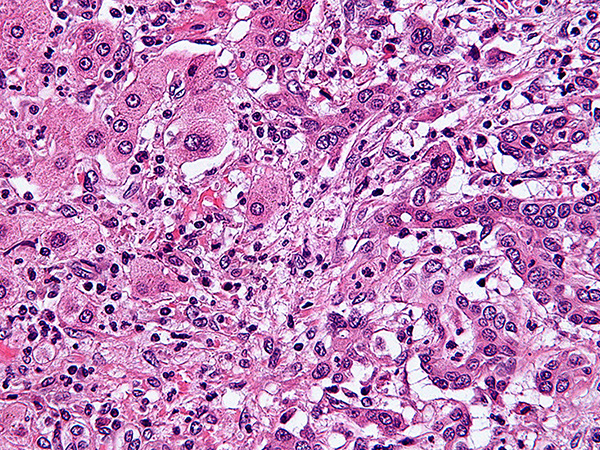A New Molecularly Targeted Therapy for Bile Duct Cancer
The FDA granted accelerated approval to a new targeted therapy for certain patients with advanced or metastatic cholangiocarcinoma.
The U.S. Food and Drug Administration (FDA) has granted accelerated approval to futibatinib (Lytgobi) for adult patients with previously treated, locally advanced or metastatic intrahepatic cholangiocarcinoma that cannot be surgically removed and harbors alterations in the fibroblast growth factor receptor 2 (FGFR2) gene.
Intrahepatic cholangiocarcinoma is a cancer that forms in the bile ducts inside the liver. Bile ducts are thin tubes that carry a fluid called bile from the liver and the gallbladder into the small intestine, where this fluid helps digest the fats in food.

Futibatinib is an inhibitor that blocks the activity of the FGFR receptors, including FGFR2, which is mutated in up to 10–15 percent of patients with this type of cancer.
The accelerated approval was based on the results of a multicenter, open-label, single-arm phase I/II clinical trial that enrolled 103 patients with previously treated, unresectable, locally advanced, or metastatic intrahepatic cholangiocarcinoma, whose tumors carried mutations in the FGFR2 gene, as determined by a sequencing test. Patients received futibatinib orally once a day until disease progression or unacceptable toxicity.
The overall response rate was 42 percent, and all 43 patients whose disease responded to futibatinib treatment experienced partial responses. The median duration of response was 9.7 months.
Cholangiocarcinoma is a rare but aggressive cancer that is often diagnosed at an advanced stage and has poor outcomes. According to federal statistics, more than 41,000 new cases of liver and bile duct cancer were estimated to be diagnosed in the U.S. in 2022.
The approval was rendered on September 30, 2022. Accelerated approval means that continued approval may be contingent upon a confirmatory trial.
